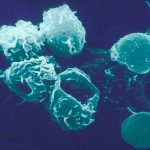Link to Pubmed [PMID] – 21518782
Infect. Immun. 2011 Jul;79(7):2801-9
In areas where Plasmodium falciparum is endemic, pregnancy is associated with accumulation of infected red blood cells (RBCs) in the placenta, a condition referred to as placental malaria (PM). Infants born to PM-positive mothers are at an increased risk of malaria, which is putatively related to the transplacental passage of parasite-derived antigens, with consequent tolerization of the fetal immune system. Here we addressed the impact of PM on the regulation of neonatal T cell responses. We found that the frequency of regulatory CD25(+) CD127(-/low) Foxp3(+) CD4(+) T cells was significantly decreased in neonates born to mothers with high levels of P. falciparum-induced placental inflammation, consisting mainly of primigravid mothers. However, at the individual level, the ratio between regulatory and effector (CD25(+) CD127(+) Foxp3(-)) CD4(+) T cells was unaffected by PM. In addition, parasite-induced CD4(+) T cell activation and production of interleukin-6 (IL-6), tumor necrosis factor alpha (TNF-α), and IL-10 were strongly reduced in neonates born to PM-positive mothers. Thus, our results show that active PM at delivery is associated with a marked suppression of P. falciparum-specific cellular neonatal immune responses, affecting secretion of both pro- and anti-inflammatory cytokines. Additionally, our results suggest that, as in adults, effector and regulatory CD4(+) T cell populations are tightly coregulated in all neonates, irrespective of the maternal infection status.

